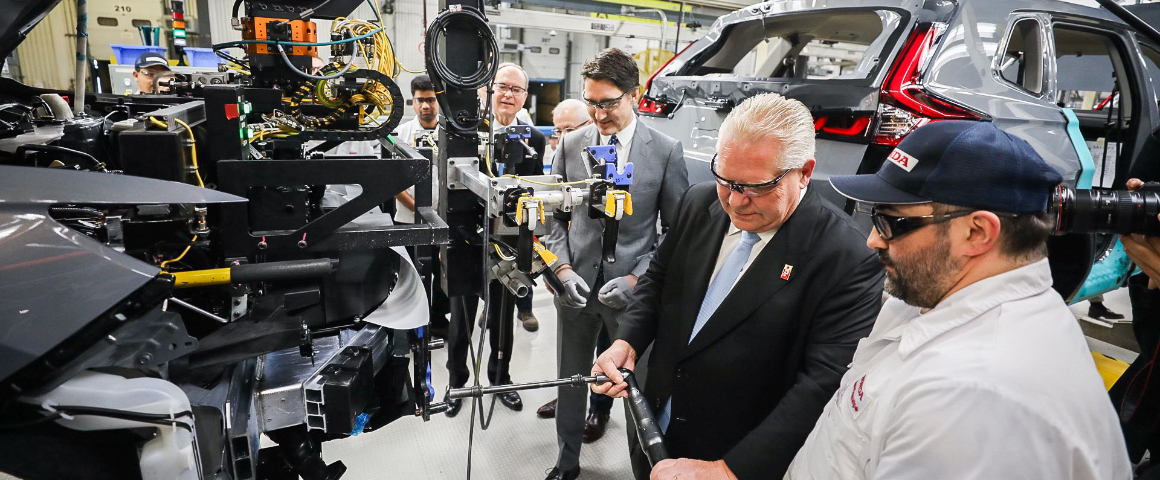PV Ontario Bureau
Doug Ford’s Ontario government, with support from Ottawa, is placing big financial bets on transforming Ontario into a complete hub for electric vehicle (EV) manufacturing. From mining the necessary battery materials to final vehicle assembly, the province aims to become a leader in the EV industry. However, this massive public investment in development comes with considerable costs – to workers, the environment and Indigenous sovereignty.
Both the Ontario and federal governments have committed tens of billions of dollars to major automakers including Stellantis, Volkswagen, Ford and Honda, to establish EV and EV battery plants in Windsor, Alliston, Oakville and St. Thomas. The Volkswagen facility alone is set to cost governments $14 billion in tax subsidies – double the amount Volkswagen itself is investing. According to the Parliamentary Budget Officer, it will take two decades for Ottawa and Queen’s Park to break even on the $28 billion in subsidies earmarked for Volkswagen and Stellantis. Honda and Ford will receive $5 billion and $590 million in public funds, respectively.
This level of state investment highlights the realities of state monopoly capitalism and the new push towards “green” investments by certain sectors of capital. But with profits being the objective of this development, it will inevitably lead to continued environmental degradation. The United States’ Biden administration has similarly funneled billions into the industry through the “Inflation Reduction Act,” sparking a race between countries to offer massive public subsidies to transnational automakers.
This competition underscores the need for Canada to reconsider free trade agreements like USMCA and instead develop a publicly owned and democratically controlled light vehicle industry. Such an industry could focus on producing electric cars, light industrial vehicles and expanding mass public transit and transportation.
While personal vehicles may remain necessary for many Ontarians due to the province’s geographically dispersed population, the future of truly sustainable transportation lies in quality mass public transit and transportation. The expansion of inter-city transit through the development of a high-speed rail system, along with the nationalization of unused Greyhound bus infrastructure and the creation of a province-wide public bus network, could provide as many jobs as the current climate-destructive pipeline projects.
The Ford government’s emphasis on car-dependent development, exemplified by the new Bill 162 Get It Done Act which weakens environmental assessment regulations to fast-track new highways like Highway 413 and the Bradford Bypass, is a step in the wrong direction.
Moreover, much of the mining required for EV battery materials is expected to occur on Indigenous lands in Northern Ontario, threatening Indigenous sovereignty.
This issue is compounded by what Indigenous nations describe as Ontario’s outdated and unconstitutional mining laws. Nipissing First Nation Chief Scott McLeod has called the province’s mining legislation “offensive,” arguing that it disregards the rights and sovereignty of Indigenous peoples. The law allows mining companies to stake claims on Indigenous lands without proper consultation or consent, violating the principles laid out in the United Nations Declaration on the Rights of Indigenous Peoples (UNDRIP).
In response to these encroachments, five First Nations have formed the First Nations Land Defence Alliance to resist Ontario’s facilitation of mining operations that they view as an assault on their land and sovereignty.
Earlier this summer, the Grassy Narrows First Nation took Ontario to court claiming that the government has a duty to consult and obtain informed consent before registering mining claims on its territory. It is seeking an order that would halt all current projects and could require the province to rescind thousands of existing mining claims.
As Ontario and Canada embark on this ambitious EV manufacturing journey, the question remains: will this development serve the needs of people and the planet, or will it prioritize profit at their expense?
Support working-class media!
If you found this article useful, please consider donating to People’s Voice or purchasing a subscription so that you get every issue of Canada’s leading socialist publication delivered to your door or inbox!
For over 100 years, we have been 100% reader-supported, with no corporate or government funding.




